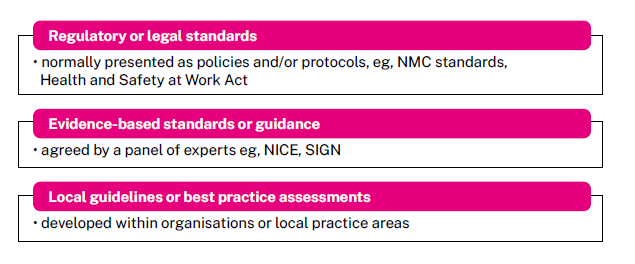Standards describe what good practice looks like based on current evidence. Standards ensure safe and high-quality care by helping to maintain consistency and safety in care delivery, reducing risks and promoting positive outcomes.
Standards clarify what is expected in terms of knowledge, skills and behaviour, supporting accountability and professionalism and reassure the public that nursing staff are held to consistent, high-quality professional benchmarks.
Think of standards as your professional compass.
Standards can be referred to as many other things, among them:
- protocols
- guidelines
- guidance
- best practice statements
- benchmarks.
Standards and guidance present in the following ways:
Accountability and delegation
The principles of accountability and delegation apply to all members of the nursing team.
Accountability
Accountability under the NMC Code (2018) involves being responsible for your actions and being able to clearly explain the rationale behind your professional decisions, including those related to delegating aspects of care. Even when you delegate tasks, you remain accountable for the outcomes and decisions made by those you delegate to.
You are expected to consistently deliver care that is both competent and safe. If at any point you feel unable to do so, it is essential to inform a senior colleague or the nurse in charge of the shift.
Delegation
Delegation is the process by which a registered professional assigns clinical or non-clinical aspects of care to a competent individual. The person delegating remains accountable for both the decision to delegate and confirming that the outcome of the delegated task meets the required standard.
Registered nurses have a key responsibility in overseeing nursing care. This includes ensuring that any delegation is appropriate and that those carrying out delegated tasks are properly supervised and supported.
For more information, visit:
- Accountability and delegation | Royal College of Nursing
- Accountability - The Nursing and Midwifery Council
- Delegation - The Nursing and Midwifery Council
Definition and Principles of Nursing
The RCN Definition and Principles of Nursing describe the standards that everyone, from nursing staff to people and populations, can expect from nursing to deliver safe and effective care. This includes the aspects of behaviour, attitude and approach that underpin good care.
Refer to the section ‘Foundations of Good Practice’ to see and read more about the principles and how you might use them in practice.
Nursing Workforce Standards
The RCN Nursing Workforce Standards are a set of 14 standards that are grouped into three key themes:
- Responsibility and accountability.
- Clinical leadership and safety.
- Health, safety and wellbeing.
They set out what we expect from employers to ensure delivery of safe and effective care. These standards apply across all areas of nursing and all sectors within the UK.
The standards support achieving the principles of nursing.
Position statements
A position statement, as the name suggests, is a statement which outlines a position on a particular topic.
RCN position statements are evidence-based documents that describe the RCN’s stance.
As a registered nurse, it is expected that you will know and understand your responsibilities to ensure that:
- regulatory standards and legal policies/protocols are adhered to
- guidance, best practice and benchmarks inform your practice decisions and interventions.
It is important that you consider how you will react in a situation where you, your team or the situation causes you to question the standard or guidance that exists.
Do not be tempted to take a risk that could harm you, your team, your organisation, and most importantly, your patient.
Reflection
![]()
Reflect on a situation where you have had a difficulty or challenged a decision.
How did you use your clinical judgement?
How was the decision informed by knowledge and understanding?
How did standards and guidance influence the decision?
Did the final decision feel right?
Reflect on your intuition/instincts - do these influence your clinical judgement?
Raising concerns
We have developed a guide to make it easier for you to assess whether a situation you’ve witnessed or experienced should be raised as a concern, and to support you through the process of reporting it.
Take me thereDuty of candour
It is entirely possible that you will make mistakes. If you do make a mistake, report it to your preceptor or the nurse in charge. It might be difficult, but putting patient safety and honesty first is vital.
Tell me more